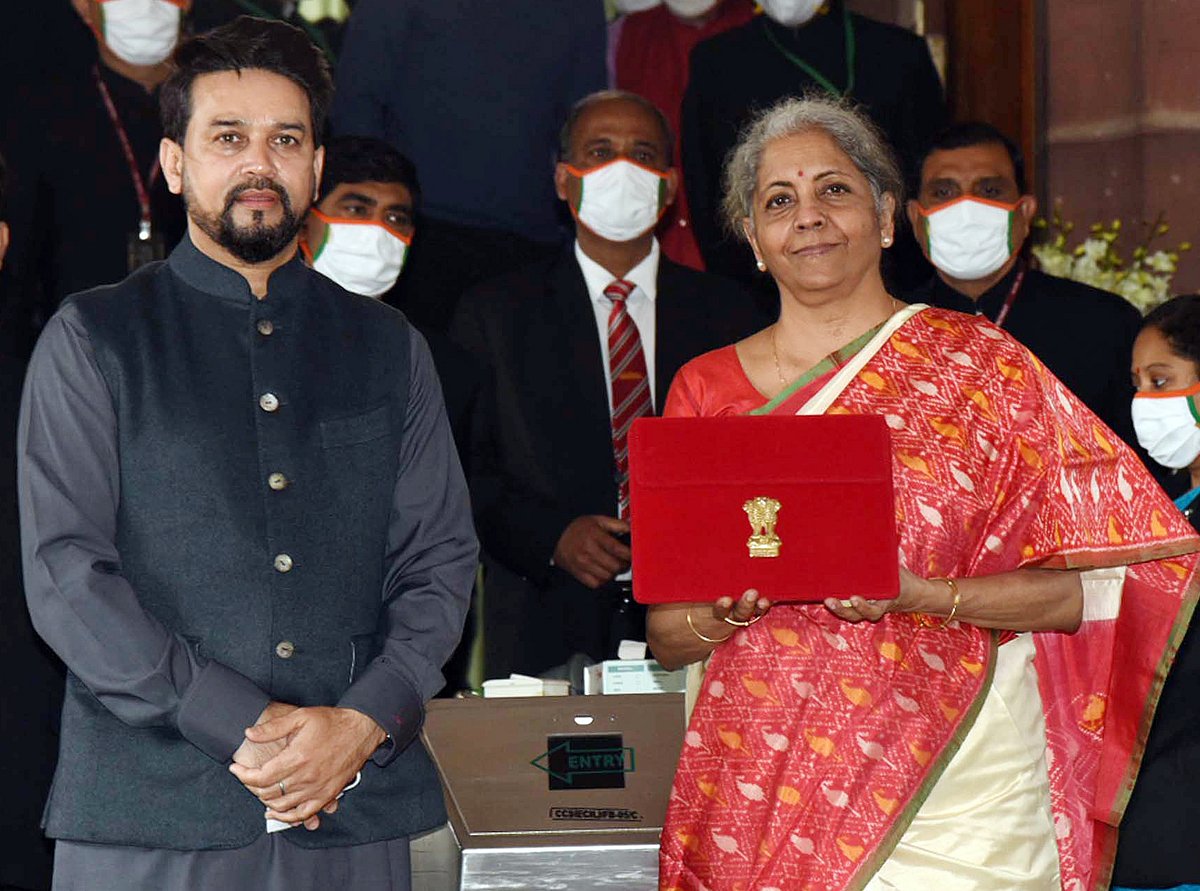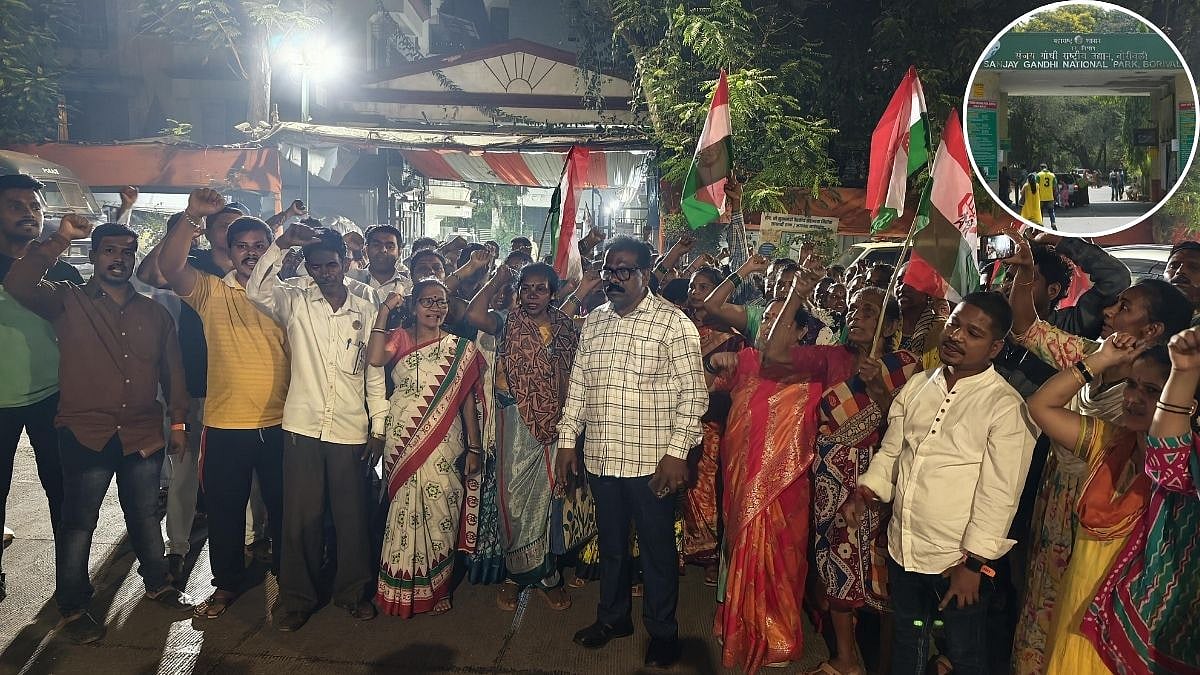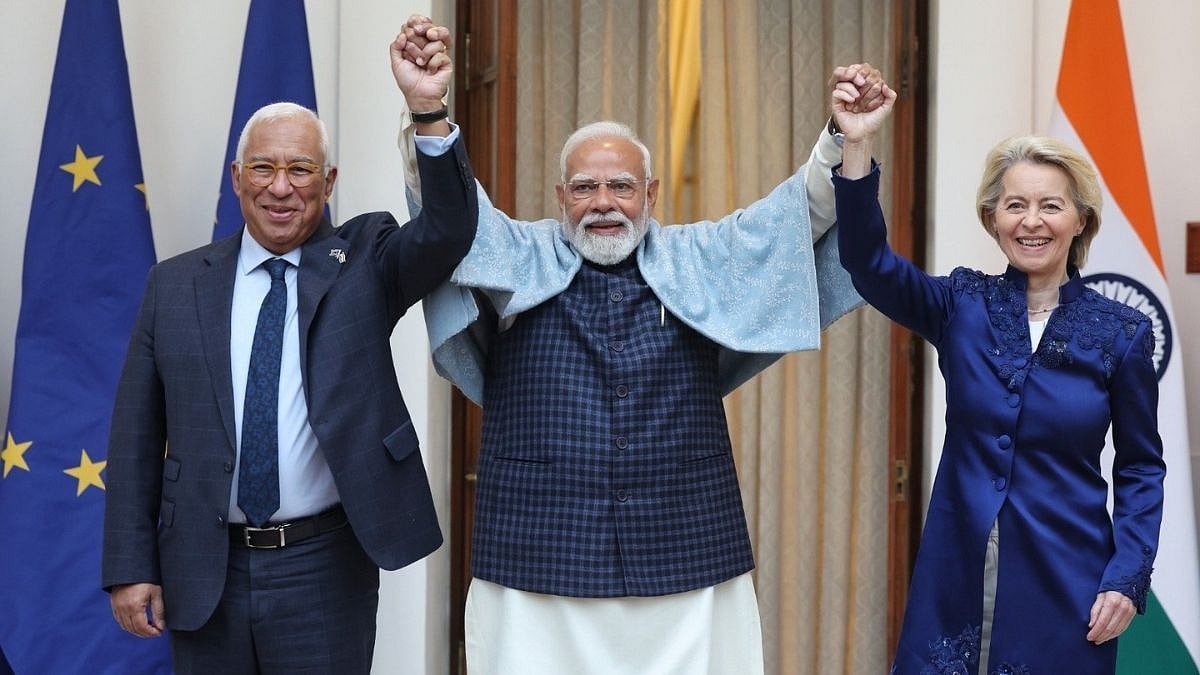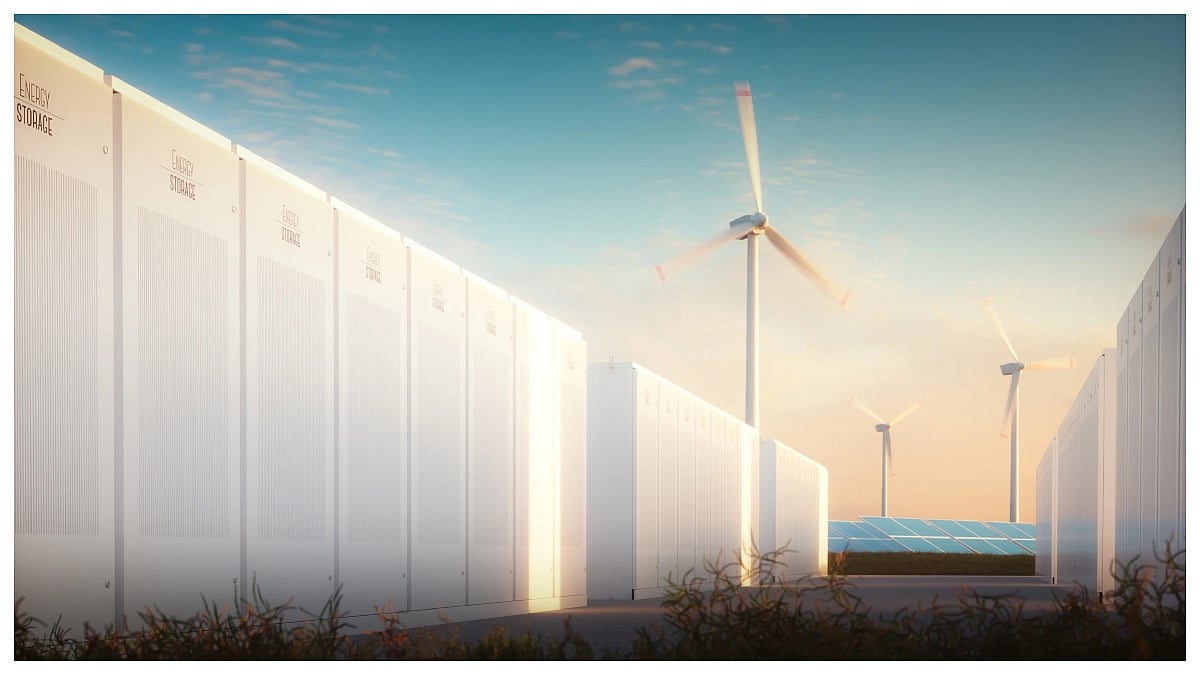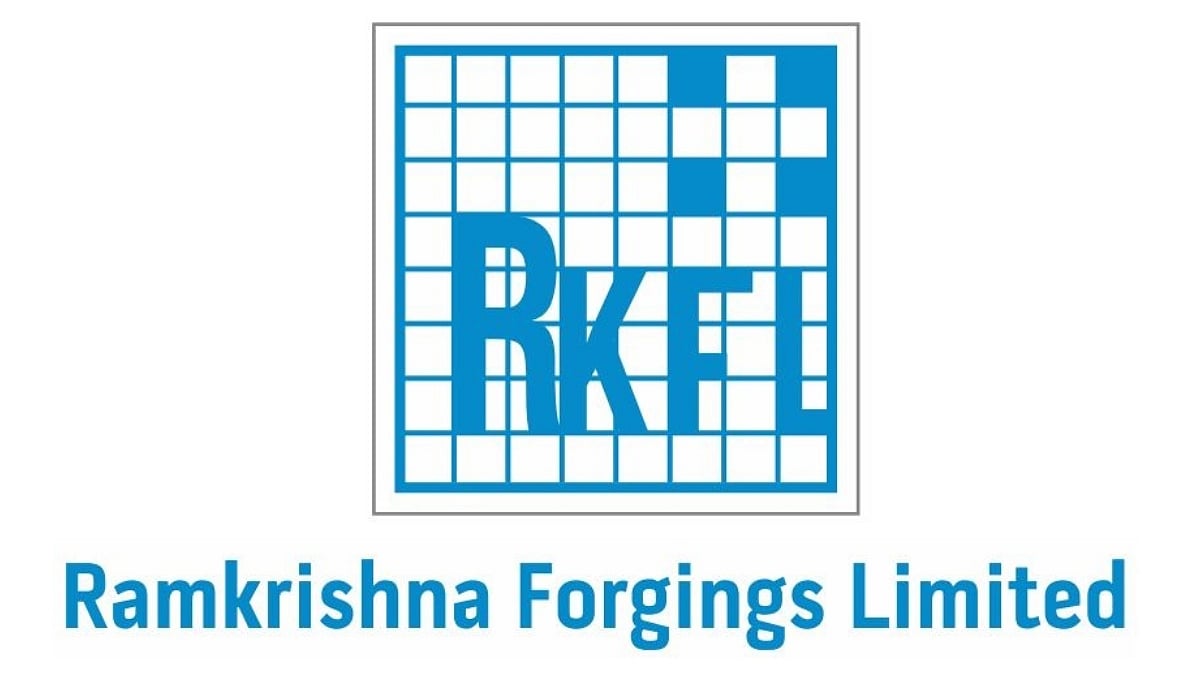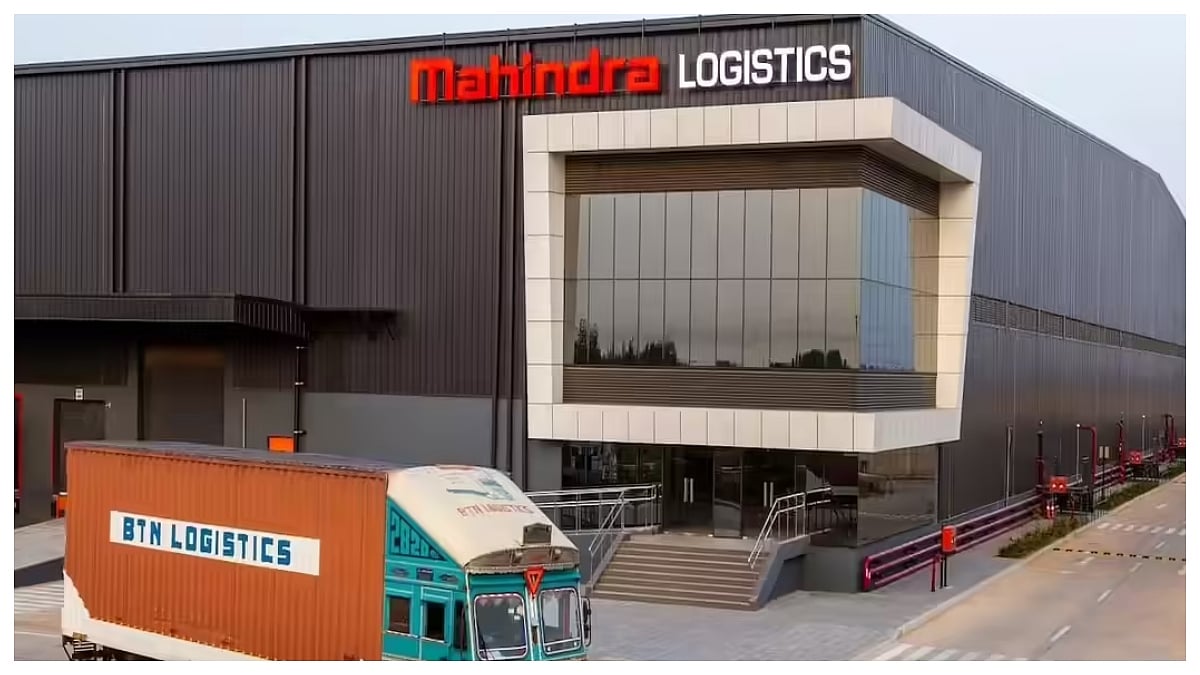Corporates have a long wishlist for Budget 2022 and hope Finance Minister Nirmala Sitharaman would have factored it in. From relief in taxes, internet connectivity, incentivising digital transactions to skill training -- the list goes on. The International Monetary Fund (IMF) has cut India's economic growth forecast to 9 percent for the current fiscal year ending March 31, joining a host of agencies which have downgraded their projections on concerns over the impact of a spread of new variant of coronavirus on business activity and mobility.
In its latest update of World Economic Outlook, the Washington-based international financial institution, which had in October last year projected a 9.5 per cent GDP growth for India, put the forecast for the next fiscal FY23 (April 2022 to March 2023) at 7.1 percent. The Indian economy had contracted by 7.3 per cent in the 2020-21 fiscal year.
Here's what corporates want from Union Budget 2022:
Ajoy Thomas, VP & Business Head, TeamLease Services
The e-commerce sector is looking for an impetus towards digitisation and incentivising digital transactions in the upcoming Union Budget. I also hope that the government cuts the corporate tax rate across the board to spur growth. To amplify the Make in India initiative, now is the time for the government to encourage product companies by introducing incentives which help them become globally competitive and take product innovation to the next level.
The Union Budget should cover certain benefits for startups, such as reduced taxes for companies with a turnover less than Rs 10 crores, and complete exemption from taxes for a duration of 3 years and on profits earned during the first 5 years. We are expecting better tax benefits for start-ups and SMEs that can further aid the growth.
Anshuman Das, CEO & Co-founder, Careernet-talent acquisition organisation
Remote working culture has resulted in a thin line of difference between work and home in the last 24 months. The Government should clarify the aspects, and their extent, of the shop and establishment act that apply to the work from home scenario. With the workforce widely spread over the country, the guidelines about professional tax, which is a state subject and collected in the state where the office(s) is located, needs to be clarified. The scope of employee policies needs to be revisited. Policies such as prevention of sexual harassment at workplace (POSH) need to be redefined keeping in mind the employees who operate remotely. The Government should adopt a holistic approach to re-evaluate labour policies and the new paradigm of taxation stemming out of the emerging remote work culture. This should not only involve amending existing, traditional laws, but introduce reforms that will boost the overall economic development.
Anshul Agrawal, Managing Partner, Mysore Deep Perfumery House (Zed Black)
The raw material prices have increased significantly during the last year especially the Paper board costs used in packaging have gone up tremendously since a year. As an agarbatti manufacturer which sells over 15 lakh packs every day, we rely highly on packaging for the launch of new products. It will be great if government can regulate that, as it will help the industry in a big way. This is to promote Make in India and support with costs competitiveness for domestic manufacturers.
Anil Gupta, Managing Director, KAPL
"The budget of FY22 should prioritise investment in infrastructure and provide incentives for investment in solar energy to promote sustainable use of resources.Encourage innovation and promote make in India considering standardised operating procedures for investments in R&D and New Product Development.Aim for ease of compliance and formalisation over GST and Taxation.Prioritise extended credit facilities to MSMEs to provide stimulus to the chemical industry.Provide subsidies for capacity expansion and promote employment. We expect the budget of FY22 to aid easy access to better infrastructure that will allow us to increase the number of exports and import substitution to further develop the chemical industry.
Bhavesh Somaya, Co-Chair, Toy Sector Committee, FICCI
In the upcoming Union Budget, we request the Finance Minister to provide for a rational and industry-forward blueprint to not only make India a hub for safe and quality toys but also to ensure that every child experiences the value of play and fun learning. A reduction in import duties on raw materials sourced from global supply chains that go into making toys and games and a uniformed GST rate policy for toys will support the domestic sector that is still at a very nascent stage. With the right fiscal framework and policy roadmap, India will emerge as a valuable sourcing hub, which will promote accessibility, availability and affordability of toys.
Devansh Jain, Executive Director, Inox Wind
Union Budget 2022-23 comes at a time when the economy is stretched and COVID concerns are still reigning supreme across the country. One good aspect is that the economy is expected to grow by at least 9 per cent even after the revised estimates. There is already a lot of emphasis from the government on green technologies and the government is pushing green energy in the country. However, while necessary steps are being taken, the green energy sector needs to be given the necessary impetus and incentives to push this eco-friendly technology across the country. This should be done in the Union Budget 2022 through fresh tax breaks and initiatives for those companies involved in producing green energy.
The government must extend concessional tax rate of 15 per cent to companies which invest in green technologies and allow full deduction towards investment or purchase of green technology assets. A credit guarantee scheme should be created, specifically for risk mitigation.
Dr. Ajai Chowdhry, Founder, HCL
The digital divide continues to pose challenges in remote teaching and learning. Almost 60 percent of school children in India do not have access to online learning, 50 percentreported internet and signal issues, whereas, about 30 percent are struggling with the cost of mobile data. Looking at this situation, the government should now focus on two things: providing "Tablets" to all school children and broadband facilities everywhere. With the right technology aids, we can together focus on improving access and quality of online education in the country.
Dr. Amitabh Saran, CEO, Altigreen Propulsion Labs
We expect Budget 2022 to focus on sustaining the growth momentum and on encouraging EV manufacturers to boost Atma Nirbhar Bharat. We expect announcements that will address the existing challenges such as reduced criteria in PLI to support young companies; support to sale / renting of charging infrastructure; support to battery cell R&D and manufacturing; push to nationalized banks for financing of EVs, and a small budget for standing guarantor for young OEM vehicle financing. We also expect rationalization of taxation policies e.g., the government should encourage EV buyers by extending FAME- II (until battery manufacturing is indigenized at commercial scale) and giving them additional reliefs or benefits on a purchase like those given to 2 wheelers. Extension of FAME-II benefits for retrofits and their inclusion in scrappage policy would be welcome.
Griffith David – Founder and MD, Habanero Foods
Along with ensuring that MSMEs receive adequate financial support, we also expect the government to implement reforms to promote domestic manufacturing. The government provides subsidies for capital investments in food processing units by MSME. Although this is a much-required support provided to the industry, the reality is that the process is laden with red tape, and thus, it is difficult for MSMEs to actually gain access to and benefit from these subsidies. Ideally, this subsidy should be linked directly to the bank where the MSME avails of the loan. Subsidies could be added automatically during bank loan disbursements, simplifying the whole process and allowing MSMEs to grow. The government and FSSAI should set up test labs and subsidize these fees, and allow industry groups like CFTRI and others to set up these facilities in every state so that MSMEs don't have to pay so much.
Gyanesh Chaudhary, Vice-Chairman & Managing Director, Vikram Solar Ltd
In order to achieve target of 500 GW renewable energy by 2030 announced at COP26 and enable the Aatmanirbhar Bharat vision, we are hopeful the Government will continue the targeted initiatives and policies to further strengthen the domestic solar manufacturing eco-system. This will accelerate economic recovery, create jobs, attract investments, increase exports, reduce dependence on imports and enable India’s Energy Security. To enhance global competitiveness of domestic solar manufacturers, the imposition of Basic Customs Duty (BCD) on solar cells & modules effective 1st April 2022, increasing the production-linked incentives (PLI) funding outlay for solar modules, enhancing the export incentive- Remission of Duties or Taxes on Export Product (RoDTEP) rates and ensuring it includes AA (Advance Authorisation) along with SEZ are critical policy interventions. We also urge the finance ministry to consider 5 percent Interest Subvention on term loans and working capital and upfront Central Financial Assistance of 30 percent on capex.
Krishna K. Jasti, Co- Founder & CEO, EVRE-EV charging Infratech
There has to be more support to enable creation of charging infrastructure by private companies, which will in turn enable large scale adoption of EVs. As EV charging infrastructure is a capital heavy business, with very little revenues as of now, it is very important to keep the capital costs as low as possible. One major way the Government could help achieve this is by subsidizing the cost of new electrical connections and fixed load charges for EV charging point operators (CPO) as most of the locations at which these charging stations are installed are not owned by the CPO and the responsibility of taking up the electrical load is always debated. If the Government can provide for the electrical load infrastructure costs in the budget, the number of charging stations we will have in our country will grow multifold.
Kartik Kalla, Chief Creative Officer, Radio City
For the radio broadcasting industry, a large portion of the revenue is generated from advertising, which was impacted due to the pandemic. In the upcoming Union Budget 2022, we expect Finance Minister Nirmala Sitharaman to allot significant funds in advertising for the radio and media industry. In addition to that, it is crucial to provide tax relief measures that will further help businesses in a smooth road to recovery. Incentives such as rationalizing the GST tax slab to 5 percent across the media industry and introducing measures that will allow industry players to create viable content can provide much required aid in a post-pandemic era. The government must also continue to take proactive measures by offering affordable internet to everyone so as to move closer towards the path of becoming a digital first country.
K Ganesh Kamath, Chief Financial Officer, Galaxy Surfactants
TDS on purchase of Goods (Sec 206C (1H) & 194Q of Income Tax, 1961) has been introduced in phases i.e., on October 1, 2020 and July 1, 2021. We understand the stance of the government in gathering independent third-party information on purchases and sales of assesses for multiple reasons, however, alternatively, the government could think of options such as mandating to furnish details of purchases and sales under an AIR by specific assesses to achieve the desired results. PLI benefits have been announced for certain sectors and additional investments by new companies have also been provided with a lower taxation regime. On the other hand, existing benefits for exports like MEIS have been substantially reduced under RoDTEP and the interest subvention scheme has been discontinued. The Government should also look at incentivizing additional investments and additional exports by existing companies.
Mukesh Surana, CFO, Garware Technical Fibres
We expect the finance minister to rationalise and allocate more funds for appropriate export tax incentives and interest subventions particularly for identified, focused, potential and scalable industries such as man-made fibres and technical textiles, in order to boost manufacturing/ make in India and export. India's manufacturing, export growth, foreign currency inward remittance, and employment prospects will all benefit considerably as a result of this.
Rahul Jha, Chief Executive Officer at LEI Register India
Although LEI registration has picked up pace over the past few years, it is imperative that certain measures are taken for improved adoption at a large scale. One long-standing demand from the government has been to start e-registration for proprietorship and partnership firms. It would go a long way in helping business firms with better credit penetration. A few recommendations include allowing and making an easy process to register businesses as a digital nomad, easing KYC norms for corporates and business firms, and linking the Legal Entity Identifier with other registration IDs, which would be helpful for regulators and banks to understand companies better. The industry is also concerned about KYC norms.
Mahesh Palashikar – President, GE South Asia
India’s commitment to achieve net zero emissions by 2070 is ambitious and prudent. However, to achieve this, we must make some important policy interventions today. Conversations on diversifying the renewables portfolio are gaining pace. Along with solar, we need policy paradigms to promote wind power, hydro power, nuclear power, green grid corridors, etc., to ultimately transition to round-the-clock hybrid power. Funding remains another critical need where government intervention would enable fast and smoother actualization of renewable energy projects in the country. I am hopeful that the upcoming Budget will directly address these specific challenges and ease the way for climate change financing to help the country transition to a net-zero emissions economy.
Rahul Kale, Founder & CEO, Sunpower Renewables Pty. Ltd.
To meet India’s goal to fulfil 50 per cent of its energy requirements from renewable energy solutions by 2030, it is crucial that the 2022 Union Budget focuses on incentives and policies to promote investments in the energy storage segment. Further, reducing the GST taxation on Lithium-ion batteries and incentivising technology adoption in the renewable energy and storage space will be the key to enabling smarter products that allow energy independence. We hope that this year’s Budget provides additional sops or incentives to boost the use of renewable energy solutions for various applications that include commercial, industrial, residential, off-grid, etc. This move will help to encourage the adoption of green technology which is vital to building a sustainable and zero-emissions future.
Samrath Kochar, Founder & CEO, Trontek-makers of E-Rickshaw batteries
Budget 2022 has an important role to play in sustaining the electric mobility momentum that the industry has built in last few years. With a few revisions in the policies, the electric dream of India can be close to reality. The government can look at reducing GST on imports, make PLI scheme more viable for the small and mid-size companies, and make India more Atmanirbhar when it comes to access to raw materials
Sumit Kumar, VP and Business Head- NETAP, TeamLease
Implementation of NEP (National Education Policy-2020), especially amending the Apprentices ACT and making way for degree apprenticeship should be one of the key agendas in the upcoming budget. Extending the incentives under NAPS 2.0 in the form of tax SOPS or higher subsidy to SMEs and tax benefits for organizations on apprentice absorption in employment post-completion of training are other crucial aspects that the Budget should look at to scale apprenticeship adoption. Reintroducing Pradhan Mantri Rozrar Protsahan Yojana and linking it with apprentice absorption is also the need of the hour. Making online guidelines flexible for higher education, formalizing the skills universities under separate regulations or making room for them in the current UGC ACT to give autonomy as they offer work integrated programs and the programs are aligned to the industry needs are some of the critical aspects that the budget should evaluate.
Sushma Vasudevan, MD and Partner, Boston Consulting Group
Budget 2022 is expected to continue its push on agri credit and infrastructure development. Additionally, focus would be on furthering the ag-tech revolution in the country with further details expected on the National Digital Agriculture Mission. The government should also continue to encourage value addition and exports to increase price realizations and quicken farm to fork channels. Support would also be much-needed for investments in productivity enhancement, like precision agriculture and automation - whether individually or at community level as well as through diversification in both crop portfolio as well as more modern agricultural practices. Also, the upcoming Budget would be a great opportunity to announce India’s plans on climate adaptation and sustainable agriculture agenda.
Shanti Ekambaram, Group President - Consumer Banking, Kotak Mahindra Bank
The COVID-19 pandemic continues to linger. Global monetary policy has seen a reversal on the back of strong growth and strong inflation. We are likely to see rate hikes this year signalling the end of monetary accommodation. We are expecting the Union Budget to continue to support growth over fiscal consolidation by continued focus on capital expenditure, rural development, pandemic-related healthcare, support to MSMEs, measures to boost green energy, and spends on public welfare. We do not expect any major changes in tax rates.
Shriprakash R. Pandey, CMD, Commtel
India’s commitment to becoming an energy-independent nation by 2047 and achieving net-zero emissions by 2070 entails bold and ambitious targets to become a global hub for renewable H2 and reduce the carbon intensity of its economy by less than 45 percent by 2030. The government’s infrastructure spending including under the national infrastructure pipeline on affordable and clean energy would be one of the key pillars. The Budget should focus on fiscal concessions and capital subsidies to support the capital expenditure to be undertaken in this regard.
Vivek Jhangiani, Chair, Toy Sector Committee, FICCI and Past President, TAITMA
Toy industry is requesting for a phased manufacturing plan to ensure holistic development of raw material sourcing and the component eco-system and simplification of multiple GST rates into one. MSMEs are the backbone of the industry and for enhancing investments need a helping hand from the government. Capital investment is the need of the hour to scale up production, skilling, innovation and toy based supply of engineering goods.
Vidit Garg, Director, MyGoldKart
Gold associations want a decrease in import duty to curb the increasing grey market smuggling of gold since 2019 as import duty was increased. Although this move will cost the government thousands of crores of rupees in income, the cost-benefit analysis suggests that the government will benefit more if the smuggling of gold is curbed in India. Lowering import duty will lead to an increase in demand for gold. Indian bullion and jewellers Association (IBJA) expects the government to eliminate commodity transaction tax (CTT) to curb Dabba trading.
Vijay Kalantri, Chairman, MVIRDC, World Trade Centre
Reform SEZ Policy: India’s exports from Special Economic Zones (SEZs) has grown from $69 billion in 2010-11 to $100 billion by 2019-20. But a large part of this growth is led by services exports. Today, services (namely IT and ITeS) contribute 57 percent to the overall exports from SEZs. There is a need to attract manufacturing investment in our SEZs and promote export of manufactured goods by addressing some of the policy constraints in this sector. Waive NFE condition: These manufacturers will grow exports while achieving early Break Even point through DTA Supplies. The SEZs and Free Trade Warehousing Zones (FTWZ) are best placed to attract these Overseas Units because of ready infrastructure and land availability. The SEZ policy must be delinked from Net Foreign Exchange (NFE) requirement. This condition has already been challenged in the WTO as it makes the SEZ Upfront Indirect tax remissions as being an Export Linked Incentive. Adopt “Duty foegone Principle”: Under the current SEZ policy, supply from SEZs to DTA is considered as import and hence it is subject to customs duty. Supplies made from the SEZs into the DTA must be charged to duty only on the “Duty foregone Principle” and not on the entire value of the product supplied which also includes local Value addition.
Devansh Jain, Executive Director, Inox Wind
The green energy sector needs to be given the necessary impetus and incentives to push this eco-friendly technology across the country. This should be done in the Union Budget 2022 through fresh tax breaks and initiatives for those companies involved in producing green energy. The government must extend concessional tax rate of 15 percent to companies which invest in green technologies and allow full deduction towards investment or purchase of green technology assets. A credit guarantee scheme should be created, specifically for risk mitigation. The renewable energy sector, which is a capital intensive sector, also requires measures in the Union Budget that will ease financing for this industry.
Nirmala Menon, Founder & CEO, Interweave Consulting
The pandemic has forced the new normal of Working From Home (WFH) for employees and Learning From Home (LFH) for students. The Budget could support employers and individuals with concessions/tax breaks for putting in place necessary Technology/Broadband/IT equipment/tools etc at homes to facilitate this so that everyone has a level and equitable playing field. This could also be extended to acquiring new skills/re-skilling in the context of the new normal. Globally there is increased awareness and alignment brought about with businesses and individuals on the need to take concrete steps towards sustainability. While large companies have the resources and expertise to invest in this, small companies struggle with the same. Keeping in mind the significant majority of Indian businesses are made of small and medium businesses, the budget could have provisions that encourage them to adopt appropriate environmental, Social, and Governance (ESG) practices into their operations and reporting.
Anil Gupta, Managing Director, CRISTOL, KAPL (Krishna Antioxidants Pvt. Ltd.)
The Budget for FY 2022-2023 announced by Finance Minister, Nirmala Sitharaman, certainly provides a significant boost to MSMEs and incentives for new manufacturing capabilities which are expected to propel growth and job creation for the sector.
The increase in allocation for renewable energy would also provide a significant boost to the fiscal capacity of states and the increase in allocation for investment in the expansion of roadways and logistics networks is also a very positive step.
Additionally, the extension of the ECLGS scheme is a welcome move for the MSME sector. Finance Minister Sitaram also stated, ‘Customs duty on certain critical chemicals are being reduced, while duty is being raised on some chemicals for which adequate domestic capacity exists,’ the changes in customs duty might enhance the value addition of local businesses.
India is one of the largest chemical producers in the world and such initiatives by the government will aid consistent growth in the sector. Rationalisation & simplification of tax especially GST was expected. However, we expect the same to be addressed separately.
